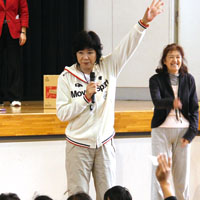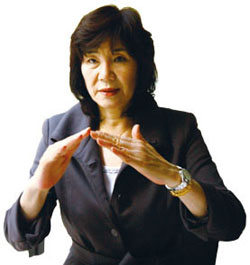SPORTS YOKOHAMA Vol.31:Feature02


アジアスポーツフェスタで参加者を
リードする白井貴子さん
After retiring, Ms. Takako Shirai, who earned a gold medal in the Montreal Olympics, founded the Montreal Olympic Volleyball Society together with other team members and journalists. She has since devoted her energy to helping improve the physical strength of children and promoting volleyball. Her activities also include social action programs, such as a sporting event known as “Asia Sports Festa” held every year at Yokohama International High School in support of Indochinese refugees living in Japan. We asked Ms. Shirai to tell us about her career as a volleyball player.
Silver Medal at the Munich Olympics
I was selected as a member of Japan’s national team at the age of 18, when I took part in the Asian Tournament. I was not a regular player at the Munich Olympics and, with the older members of the team playing very well, I just thought it would be great if we could win a gold medal. But looking back from now, I can see that the reason they took me to Munich was probably because they had this idea in mind of using me as the ace of the team for the next Olympic Games to be held fours years later. I was just excited about going to the Olympics and didn’t care much about competing.
I thought the only reason they chose me was that I was tall and, since I was still growing up at the time, I didn’t have enough stamina to keep up with the other team members during training sessions. Being the youngest in the team was mentally hard too. I would think about quitting when I woke up every morning (laughter).
Gold Medal at the Montreal Olympics
At the Munich Olympics, the Japanese team lost and ended up with a silver medal, which many of us had never thought of. In 1974, the Japanese team won a gold medal at the World Championships when such a feat had been least expected. Going to Montreal, we were considered the likeliest winner and, in fact, we earned a gold medal. There was of course a lot of pressure, but we overcame it by working hard. And the disappointment we felt when we lost in Munich also helped us. In those days, the final game of almost every tournament was between Japan and the Soviet Union. At the time of the Montreal Olympics, the Soviet team was in a period of transition, while the Japanese team was dominantly young, with me being among the older players at the age of 24.
Experience is very important for people. I hated training, but after joining Hitachi, I learned that you should do a lot of training in order to win. When I was younger, I would think to myself, “What is all this training for?” But it has turned out that what I did during all those training sessions is not a waste of time.
Montreal Olympic Volleyball Society
The first project I did after founding the Montreal Olympic Volleyball Society was to hold volleyball classes for Bhutanese refugees in Nepal. Before stepping foot in that place, I had never imagined that the world had a problem like the one I witnessed there.
When I asked the children what they would want to be in the future, they said they wanted to do jobs to help people in need. They themselves were the ones in need. Their answer moved me. It was really touching. So I wondered what I could do for people like these kids, and that led me to organize “Asia Sports Festa,” which takes place every year at Yokohama International High School to offer opportunities for refugees living in Japan to enjoy sports. This year, we will hold Asia Sports Festa on October 28.
One year, I brought sweet potatoes to the Festa, and the participants enjoyed those sweet potatoes most. More than anything else. At other times, I brought bread provided by sponsors, which they liked too. Food contributions are always very welcome. I’d appreciate it very much if more people would cooperate with us.
 Profile
Profile
Takako Shirai (married name: Takagi)
Born in 1952 in Okayama City, Okayama Prefecture. Height: 180 cm
1968 Left Katayama Girls’ High School to join Kurabo Kurashiki.
1972 Her team lost to the Soviet team in the final at the Munich Olympics and received a silver medal. Retired from competitive career.
1973 Joined Hitachi to return to competitive career.
1974 Her team beat the Soviet team in the final at the World Championships to win the title.
1976 Her team beat the Soviet team in the final at the Montreal Olympics to earn a gold medal. Retired from competitive career.
1977 Returned to competitive career. Her team beat the Cuban team in the final at the World Cup to win the title.
1978 Retired from competitive career.
2000 Became the first female Japanese player to be honored in the Volleyball Hall of Fame.
Ms. Shirai currently serves as the representative director of the NPO Montreal Olympic Volleyball Society.
She is also in charge of physical strength improvement at the Saibi Education Center in Suginami Ward, Tokyo.
Ms. Takako Shirai leading the participants in Asia Sports Festa


アジアスポーツフェスタで参加者を
リードする白井貴子さん
After retiring, Ms. Takako Shirai, who earned a gold medal in the Montreal Olympics, founded the Montreal Olympic Volleyball Society together with other team members and journalists. She has since devoted her energy to helping improve the physical strength of children and promoting volleyball. Her activities also include social action programs, such as a sporting event known as “Asia Sports Festa” held every year at Yokohama International High School in support of Indochinese refugees living in Japan. We asked Ms. Shirai to tell us about her career as a volleyball player.
Silver Medal at the Munich Olympics
I was selected as a member of Japan’s national team at the age of 18, when I took part in the Asian Tournament. I was not a regular player at the Munich Olympics and, with the older members of the team playing very well, I just thought it would be great if we could win a gold medal. But looking back from now, I can see that the reason they took me to Munich was probably because they had this idea in mind of using me as the ace of the team for the next Olympic Games to be held fours years later. I was just excited about going to the Olympics and didn’t care much about competing.
I thought the only reason they chose me was that I was tall and, since I was still growing up at the time, I didn’t have enough stamina to keep up with the other team members during training sessions. Being the youngest in the team was mentally hard too. I would think about quitting when I woke up every morning (laughter).
Gold Medal at the Montreal Olympics
At the Munich Olympics, the Japanese team lost and ended up with a silver medal, which many of us had never thought of. In 1974, the Japanese team won a gold medal at the World Championships when such a feat had been least expected. Going to Montreal, we were considered the likeliest winner and, in fact, we earned a gold medal. There was of course a lot of pressure, but we overcame it by working hard. And the disappointment we felt when we lost in Munich also helped us. In those days, the final game of almost every tournament was between Japan and the Soviet Union. At the time of the Montreal Olympics, the Soviet team was in a period of transition, while the Japanese team was dominantly young, with me being among the older players at the age of 24.
Experience is very important for people. I hated training, but after joining Hitachi, I learned that you should do a lot of training in order to win. When I was younger, I would think to myself, “What is all this training for?” But it has turned out that what I did during all those training sessions is not a waste of time.
Montreal Olympic Volleyball Society
The first project I did after founding the Montreal Olympic Volleyball Society was to hold volleyball classes for Bhutanese refugees in Nepal. Before stepping foot in that place, I had never imagined that the world had a problem like the one I witnessed there.
When I asked the children what they would want to be in the future, they said they wanted to do jobs to help people in need. They themselves were the ones in need. Their answer moved me. It was really touching. So I wondered what I could do for people like these kids, and that led me to organize “Asia Sports Festa,” which takes place every year at Yokohama International High School to offer opportunities for refugees living in Japan to enjoy sports. This year, we will hold Asia Sports Festa on October 28.
One year, I brought sweet potatoes to the Festa, and the participants enjoyed those sweet potatoes most. More than anything else. At other times, I brought bread provided by sponsors, which they liked too. Food contributions are always very welcome. I’d appreciate it very much if more people would cooperate with us.
 Profile
Profile
Takako Shirai (married name: Takagi)
Born in 1952 in Okayama City, Okayama Prefecture. Height: 180 cm
1968 Left Katayama Girls’ High School to join Kurabo Kurashiki.
1972 Her team lost to the Soviet team in the final at the Munich Olympics and received a silver medal. Retired from competitive career.
1973 Joined Hitachi to return to competitive career.
1974 Her team beat the Soviet team in the final at the World Championships to win the title.
1976 Her team beat the Soviet team in the final at the Montreal Olympics to earn a gold medal. Retired from competitive career.
1977 Returned to competitive career. Her team beat the Cuban team in the final at the World Cup to win the title.
1978 Retired from competitive career.
2000 Became the first female Japanese player to be honored in the Volleyball Hall of Fame.
Ms. Shirai currently serves as the representative director of the NPO Montreal Olympic Volleyball Society.
She is also in charge of physical strength improvement at the Saibi Education Center in Suginami Ward, Tokyo.
Ms. Takako Shirai leading the participants in Asia Sports Festa
 ハマスポ
ハマスポ
 お知らせ&トピックス
お知らせ&トピックス ページトップへ戻る
ページトップへ戻る ページトップへ戻る
ページトップへ戻る

